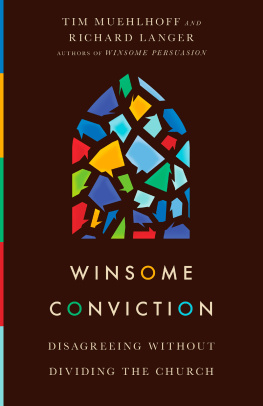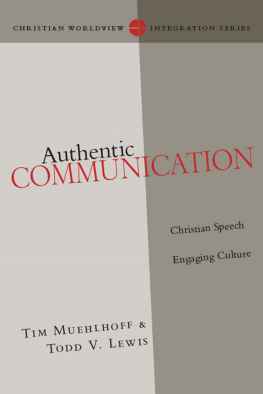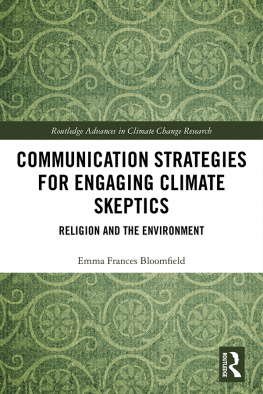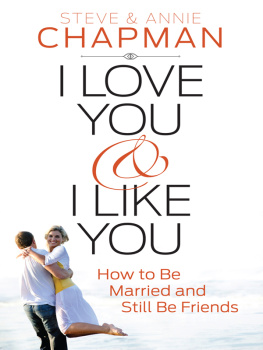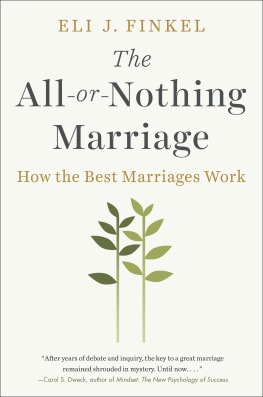5

Talking Your Way into a Supportive Climate
H ave you ever played Whack-a-Mole?
Its an arcade game where you stand at a waist-level cabinet holding a rubber mallet. On the surface of the cabinet are five holes. Randomly, up from a hole pops an electronic mole, and your job is to hit it as soon as it rears its head. The more quickly you whack it, the more points you get.
Noreen has commented that many couples have a communication pattern that resembles Whack-a-Mole. One partner says something, and the other is waiting with a verbal club to pounce. Every idea or suggestion is met with an air of superiority accompanied by a verbal whack. Honey, dont you think we should first... Whack! Hey, what would you think if we... Whack! Whack! I know you said we didnt have the money for this, but I thought... Whack! Whack! Whack! Eventually, the spouse gives up. In the arcade game, if you keep putting in quarters, the moles will keep popping up to get a beating. In a communication climate with our spouse, we may stop offering our opinion altogether if we feel it would be demeaned.
Communication scholar Jack Gibb, after years of watching individuals interact, began to notice positive and negative patterns in communication climates. Specifically, he identified six forms of communication that move individuals Do we communicate in a manner that promotes a positive climate or one that compares to Whack-a-Mole? In the following pages well look at differing styles of communication in the form of six pairings that offer us choiceschoices that make all the difference in the type of climate we experience.
Strategy Versus Spontaneity
A few years ago, I participated in a debate with a former evangelist turned atheist. My opponent had a degree in religion, had written numerous books attacking the Christian faith and had belonged to a high-IQ society that required members to be in the 99.997th percentile. In front of a packed auditorium on the campus of Marshall University in Huntington, West Virginia, we debated whether Jesus resurrection was fact or fantasy. Its the oddest feeling knowing that while you are speaking another person is listening to every word, looking for contradictions, inconsistencies and other weaknesses. Even when he asked a seemingly innocent question, I felt he had a secret agenda and that I was playing into his hands. I left the debate drained. To have to weigh every word you say is mentally and emotionally exhausting.
This is what Gibb means by a strategy approach to communication. During a conversation with your spouse, do you sometimes feel that you are participating in a mental chess match? Your spouse asks, Do you have plans Saturday morning? When you answer no, he or she pounces: Then theres no reason you cant help me clean the garage. Checkmate. These types of questions are referred to as counterfeit questions that are strategically designed to trap a person. The result is that in future conversations you become increasingly defensive and protective in your answers.
In contrast, spontaneous communication is free of manipulation. Spontaneity does not mean that you say whatever you are thinking during a conversation, nor does it mean that you cant choose to be silent and carefully process your answer before articulating it. Being spontaneous primarily means that you feel the freedom to offer opinions that are still in process, without the fear that any inconsistencies or contradictions you utter will be immediately attacked.
My wife and I regularly meet with a group of four couples to discuss everything from marriage to theology to movies to the Super Bowl. Conversations often start with, I havent fully thought this out, but what if... While good-natured ribbing is part of our conversations, there is freedom to offer an opinion thats still in process. At the center of a spontaneous approach to communication is trust . I trust you not to use my words against me as I openly work out my response to important issues. I also trust that the questions you ask (such as Do you have plans for Saturday morning?) are not presented with a secret agenda.
Neutrality Versus Empathy
When speaking with a person, we can become defensive if we perceive our thoughts, passions and convictions are met with detached, distant neutrality. Whenever I think of Gibbs idea of detached neutrality, I remember being stranded in a Memphis airport. My wife and I had been flying all day with three exhausted boys. All we wanted to do was get on this last flight and head home. When I went to pick up our boarding passes, I was informed that my entire family had been bumped from the flight. Sir, we are in an oversold situation and needed to place your family on a later flight, the agent said in a matter-of-fact way. I explained wed been flying all day and the kids were worn out. Without looking up, she responded, Sir, on the back of your ticket, its written that we reserve the right to bump individuals at our discretion. Her voice was cool, controlled and uninterested. Mine was not. I again explained our situation. She looked over my shoulder at the line forming and said, Next. As I walked away to plot my next move, I was frustrated beyond words. How could she not even acknowledge the tiredness of my family?
Imagine getting that kind of response from a spouse. Two weeks after being stranded in the airport, I was speaking with a couple at a marriage workshop, and she was telling me how her husbands desire to finish graduate schoolwhile working two jobswas killing the family. I never see him anymore, she said. Im starting to believe that a degree is more important than me and the kids. As she spoke, powerful emotions started to surface.
And Ill never forget his response. With not a trace of emotion, he replied, Ive been gone a lot. That was it. I waited for him to say more, but he didnt. In five lifeless words, he summarized her pain and concern. The tone of his voice matched that of the disinterested flight agent. Marriage expert John Gottman states that regularly distancing yourself from your spouse emotionally and psychologicallywhich he calls stonewalling is the most destructive habit you can form in a marriage.
The opposite of neutrality is empathy. The word empathy originates from two Greek words that together mean feeling inside. Based on this definition, empathy is the attempt to experience and acknowledge the emotions of another. The call to empathy is vividly expressed by the writer of Hebrews, who encourages us to empathize with persecuted Christians. We are called not only to remember those in prison who are mistreated, but to do so as if you yourselves were suffering (13:3). We are directed to imagine prison life, and all the emotions associated with it, through the perspective of those imprisoned.
If the Memphis ticket agent had said, Mr. Muehlhoff, I can imagine how frustrating this must be for you. You and your family have had a long day and now weve made it longer. Id be upset as well, that would have been much better. What if the husband in my workshop had said to his discouraged wife, Trying to pick up the slack at home while I juggle work and school must be exhausting. I know Ive not been around much, and that must be difficult for you and the kids. Empathy does not mean that you completely agree with a persons assessment; it means that you attempt to see life through the perspective of your spouse. Author Maria Lugones creatively calls empathy world-traveling; you leave your familiar surroundings and enter into the social and personal world of another.
Certainty Versus Provisionalism
Have you run into individuals who are certain they are right concerning an issue? Individuals whose words are laced with dogmatism and who are absolutely certain they have a corner on the truth and seek to demean anyone who disagrees? Im telling you right now, thatll never work. Thats not how I would do it. I cant see you going anywhere in that profession. Id never let my kids get involved in that. Clearly, the Bible teaches that we should believe this. If youve ever had those phrases directed at you, you understand why certainty language fosters defensiveness and shuts down communication.



